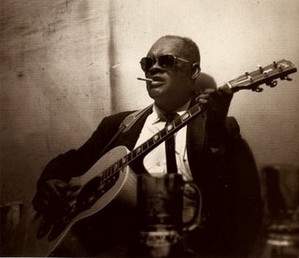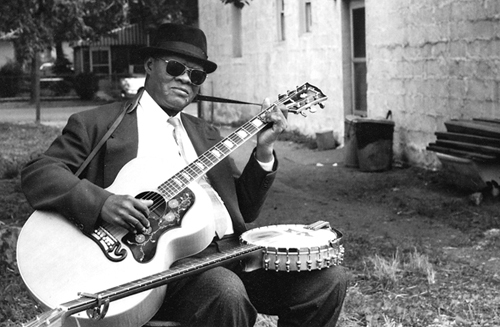<Back to Index>
- Guitarist and Singer Floyd Council, 1911
- Guitarist and Singer Reverend Gary Davis, 1896
PAGE SPONSOR
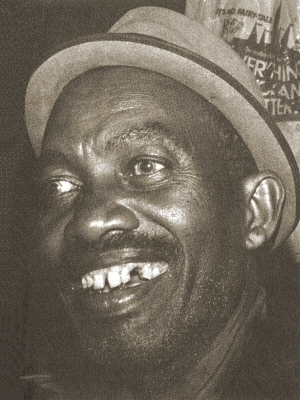
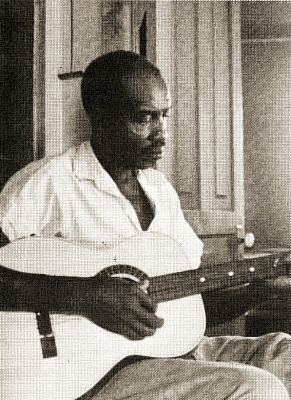
Floyd Council (September 2, 1911 - May 9, 1976) was an American blues guitarist, mandolin player and singer. He became a well known practitioner of the Piedmont blues sound from that area, popular throughout the southeastern region of the US in the 1930s.
Born in Chapel Hill, North Carolina, United States, to Harrie and Lizzie Council, Floyd began his musical career on the streets of Chapel Hill in the 1920s, performing with two brothers, Leo and Thomas Strowd as "The Chapel Hillbillies". In the late 1920s and early 1930s he and Blind Boy Fuller busked in the Chapel Hill area. He recorded twice for ARC at sessions with Fuller in the mid thirties, all examples of the Piedmont style.
Council suffered a stroke in the late 1960s which partially paralyzed his throat muscles and slowed his motor skills, but did not significantly damage his cognitive abilities. Folklorist Peter B. Lowry attempted to record him one afternoon in 1970, but he never regained his singing or playing abilities. Accounts say that he remained "quite sharp in mind".
Council died in 1976 of a heart attack, after moving to
Sanford, North Carolina. He was buried at White Oak AME
Zion Cemetery in Sanford.
Syd Barrett, of English psychedelic rock band Pink Floyd,
came up with the band's name by juxtaposing the first
names of Council and South Carolina bluesman Pink
Anderson. He noticed the names in the liner notes of a
1962 Blind Boy Fuller LP. The text, written by Paul
Oliver, read: "Curley Weaver and Fred McMullen, (...) Pink
Anderson or Floyd Council - these were a few amongst the
many blues singers that were to be heard in the rolling
hills of the Piedmont, or meandering with the streams
through the wooded valleys."
No records are available which exclusively feature Council's work. However, the CD, Carolina Blues, features six songs which he recorded: "I'm Grievin' and I'm Worryin'", "I Don't Want No Hungry Woman", "Lookin' For My Baby", "I'm Broke and I Ain't Got a Dime", "Runaway Man Blues" and "Working Man Blues".
According to a 1969 interview, Council stated he had
recorded 27 songs over his career, seven of them backing
Blind Boy Fuller. Fuller's series of Complete Recorded
Works contain many songs in which Council played
guitar.
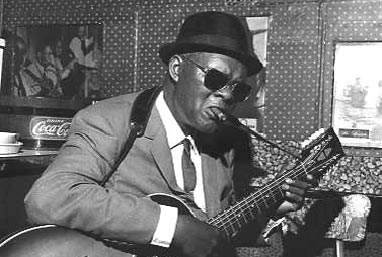
Reverend Gary Davis, also Blind Gary Davis, (April 30, 1896 - May 5, 1972) was an American blues and gospel singer and guitarist, who was also proficient on the banjo and harmonica. His finger picking guitar style influenced many other artists and his students in New York included Stefan Grossman, David Bromberg, Roy Book Binder, Larry Johnson, Woody Mann, Nick Katzman, Dave Van Ronk, Tom Winslow and Ernie Hawkins. He has influenced Bob Dylan, The Grateful Dead, Jackson Browne, Townes van Zandt, Wizz Jones, Jorma Kaukonen, Keb' Mo', Ollabelle, Godspeed You Black Emperor! and Resurrection Band.
Gary Davis was born in Laurens, South Carolina, and was the only one of eight children his mother bore who survived to adulthood. He became blind as an infant. Davis reported that his father was killed in Birmingham, Alabama, when Davis was ten, and Davis later said that he had been told that his father had been shot by the Birmingham High Sheriff. He recalled being poorly treated by his mother and that before his death his father had given him into the care of his paternal grandmother.
He took to the guitar and assumed a unique multi - voice
style produced solely with his thumb and index finger,
playing not only ragtime and blues tunes, but also
traditional and original tunes in four - part harmony.
In the mid 1920s, Davis migrated to Durham, North Carolina, a major center for black culture at the time. There he collaborated with a number of other artists in the Piedmont blues scene including Blind Boy Fuller and Bull City Red. In 1935, J. B. Long, a store manager with a reputation for supporting local artists, introduced Davis, Fuller and Red to the American Record Company. The subsequent recording sessions marked the real beginning of Davis' career. During his time in Durham, Davis converted to Christianity; in 1937 he would be ordained as a Baptist minister. Following his conversion and especially his ordination, Davis began to express a preference for inspirational gospel music.
In the 1940s, the blues scene in Durham began to decline and Davis migrated to New York. In 1951, well before his 'rediscovery', Davis's oral history was recorded by Elizabeth Lyttleton Harold (the wife of Alan Lomax) who transcribed their conversations into a 300+ page typescript.
The folk revival of the 1960s re-invigorated Davis' career, culminating in a performance at the Newport Folk Festival and the recording by Peter, Paul and Mary of "Samson and Delilah", also known as "If I Had My Way", originally a Blind Willie Johnson recording that Davis had popularized.
Davis died in May 1972, from a heart attack in Hammonton,
New Jersey. He is buried in plot 68 of Rockville Cemetery
in Lynbrook, Long Island, New York.
